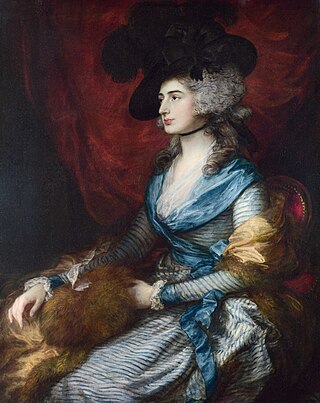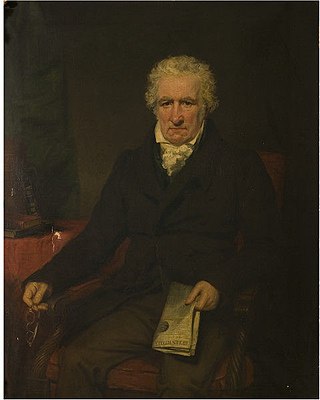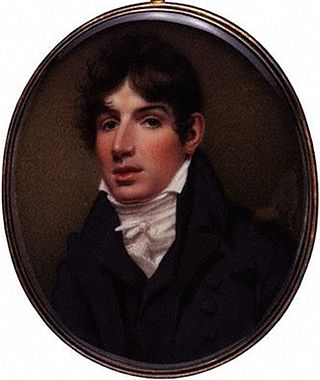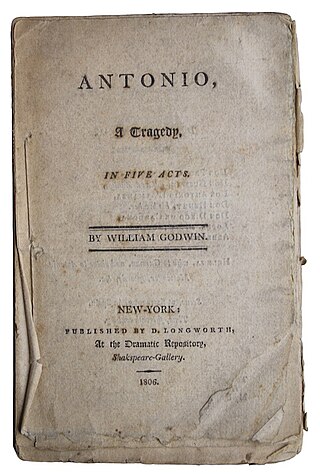
Sarah Siddons was a Welsh actress, the best-known tragedienne of the 18th century. Contemporaneous critic William Hazlitt dubbed Siddons as "tragedy personified".

George Stephen Kemble was a successful English theatre manager, actor, and writer, and a member of the famous Kemble family. He was described as "the best Sir John Falstaff which the British stage ever saw" though he also played title roles in Hamlet and King Lear among others. He published plays, poetry and non-fiction.

Robert William Elliston was an English actor and theatre manager.

Elizabeth Inchbald was an English novelist, actress, dramatist, and translator. Her two novels, A Simple Story and Nature and Art, have received particular critical attention.

John Bell (1745–1831) was an English publisher. Originally a bookseller and printer, he also innovated in typography, commissioning an influential font that omitted the long s. He drew the reading public to better literature by ordering attractive art to accompany the printed work.

William Henry West Betty was a popular child actor of the early nineteenth century, known as "the Young Roscius."
Sonnets on Eminent Characters or Sonnets on Eminent Contemporaries is an 11-part sonnet series created by Samuel Taylor Coleridge and printed in the Morning Chronicle between 1 December 1794 and 31 January 1795. Although Coleridge promised to have at least 16 poems within the series, only one addition poem, "To Lord Stanhope", was published.

Henry Siddons was an English actor and theatrical manager, now remembered as a writer on gesture.

Sarah Bartley (1783–1850) was a British actress who began her career when she was 16.

Jane Powell or Mrs Powell was a British actress. She was also known as Mrs Renaud and Mrs Farmer.

The Fair Circassian is a 1781 tragedy by the British writer Samuel Jackson Pratt. It is an adaptation of the novel Almoran and Hamet by John Hawkesworth. He wrote the lead role for his friend Sarah Siddons, but due to other commitments it ended up being played by Elizabeth Farren.
The Campaign: or, Love in the East Indies is a 1784 comedy play with songs by the Irish writer Robert Jephson.

The Way to Get Married is a 1796 comedy play by the British writer Thomas Morton. The play was frequently revived well into the nineteenth century.
The Vindictive Man is an 1806 comedy play by the British writer Thomas Holcroft.
The Conspiracy is a 1796 tragedy by the Irish writer Robert Jephson.
Almeyda, Queen of Granada is a 1796 tragedy play by the British writer Sophia Lee.

Adelgitha is a tragedy by the British writer Matthew Lewis. It premiered at the Theatre Royal, Drury Lane on 30 April 1807 having originally been published the year before. The cast included Henry Siddons, Robert William Elliston, George Frederick Cooke and Jane Powell while the incidental music was composed by Michael Kelly. It was one in a run of Gothic plays Lewis produced following the success of The Castle Spectre. The play is set in Otranto around 1080 which was ruled over by Robert Guiscard following the Norman conquest of southern Italy.

The Curfew is a historical tragedy by the British writer John Tobin which was first published in 1807, three years after the author's death. It was staged by Richard Brinsley Sheridan at the Theatre Royal, Drury Lane in London premiering on 19 February 1807. The cast included William Barrymore as Hugh de Tracy, John Bannister as Robert, Henry Siddons as Bertrand, William Penley as Walter, Robert William Elliston as Fitzharding, Edmund John Eyre as Philip, Jane Powell as Matilda and Maria Duncan as Florence. It appeared at the Crow Street Theatre in Dublin on 1 April the same year. It is set during the Norman era.
The Siege of St Quintin is an 1808 historical play by the British writer Theodore Hook. It is inspired by the 1557 Battle of St. Quentin. Its theme of a past Anglo-Spanish victory over the French was in line with British support for modern Spain in the Peninsular War following its invasion by Napoleonic forces the same year. It premiered at the Theatre Royal, Drury Lane on 10 November 1808. Revisions were made by Richard Brinsley Sheridan and his son Thomas Sheridan, part of the management of Drury Lane. The original Drury Lane cast included Robert William Elliston as Count Egmont, James William Wallack as Theodore, John Braham as Everard, Vincent De Camp as Bertrand, Harriet Siddons as Adriana, John Henry Johnstone as Sir Leinster Kildare, Walter Maddocks as Captain McIntyre, William Penley as Jack, Thomas Cooke as Sergeant Sturdy, Matilda Ray as Rosa De Valmont and Charlotte Tidswell as Margaret. Accompanying music was composed by James Hook.

Antonio, or the Soldier's Return is an 1800 historical tragedy by the British writer William Godwin. It premiered at the Theatre Royal, Drury Lane on 13 December 1800. The cast included John Philip Kemble as Antonio, Sarah Siddons as Helena, William Barrymore as Don Gusman, Richard Wroughton as Don Pedro, Charles Kemble as Don Henry William Powell as Don Diego. Both the audience and critical reaction was negative. Seven years later another of Godwin's plays Faulkener was staged at the same theatre.














